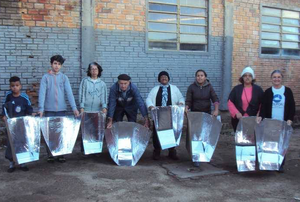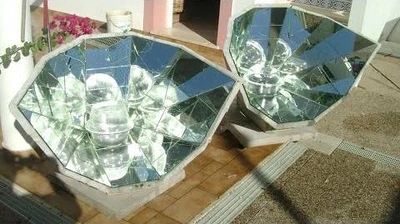m (Upgraded Youtube tag) |
Tom Sponheim (talk | contribs) mNo edit summary Tag: Source edit |
||
| (116 intermediate revisions by 8 users not shown) | |||
| Line 1: | Line 1: | ||
{{GoogleTranslateLinks}} |
{{GoogleTranslateLinks}} |
||
| + | {{Updated|9|19|23}} |
||
| − | {| align="right" width=350px |
||
| ⚫ | |||
| − | |- |
||
| − | |[[Image:Brazilian_scavengers.jpg|350px]] |
||
| − | |- |
||
| ⚫ | |||
| − | |} |
||
==Events== |
==Events== |
||
| + | {{BrazilEvents}} |
||
| − | See [[Calendar of events]] |
||
| + | {{CalendarAndPastEvents}} |
||
| − | ==News and Recent Developments== |
||
| + | =={{HeadingNews}}== |
||
| − | [[File:DSCF1021.jpg|thumb|Nicolau with P.S.II.2 (http://plenosol.wordpress.com/fornos-solares/p-s-ii-2/)]] |
||
| + | *{{NewMar20}}'''March 2020:''' [http://www.sunpod.de/2020/03/268-sunpod-interview-prof-elmo-dutra-filho-teaching-solar-cooking-to-poor-people-in-brazil/ Prof. Elmo Dutra Filho – Teaching Solar Cooking to Poor People in Brazil] - ''SunPod'' |
||
| − | *'''November 2012: Baking with a solar box cooker''' - In 2010, [[Nicolau Bussolotti Francine]] of Sao Paulo, Brazil, developed a box solar cooker for baking. Francine reports that his model can bake up to one kilo of cookies or 36 muffins at one time. In 2011 he began developing a more powerful bread oven. Using SCI’s Solar Cooking wiki, Francine was able to make contact with other solar cooker manufacturers who were using Fresnel lenses. He incorporated multiple plain Fresnel lenses into his new design. His company [[Plenosol Cozinha Solar]] has recently filled a large order from an NGO working in the Natural Reserve Serra das Almas. |
||
| + | *{{NewAug19}}'''August 2019:''' [[Elmo Dutra]], from [[Fogão Solar]], represented solar cooking at the seminar on sustainable urban management in the legislative assembly in Porto Alegre, [[Brazil]] on August 8th. |
||
| − | [[File:LEM_Capacitação_November_2012.jpg|190px|right]] |
||
| + | :<gallery widths="300" spacing="small"hideaddbutton="true"columns=2> |
||
| − | *'''November 2012:''' An experimental solar cooking school has been established by the [[Energy and Materials Laboratory]] (LEM) at the Mechanical Engineering School of the Federal University of Sergipe in Brazil. The Project’s Field research is being coordinated in a socially vulnerable community in Brazil by Dr. [[Paulo Mário Machado Araújo]]. The Energy and Material Laboratory was founded in 2001. It’s situated in the Mechanical Engineering Department of the Federal University of Sergipe, and is coordinated by the professor Dr. Paulo Mário Machado Araújo. The laboratory works with applied research, focusing on social technologies and trying to improve the quality of life for people living in poor communities. One of LEM´s outstanding projects, the Experimental Solar Kitchen School, was innovational in creating a laboratory in a socially vulnerable community. There it was possible to experience the benefits of solar kitchens to guaranty nutrition, social inclusion, human health and environmental education, as well as the construction of solar ovens, and production of carbon credits. Another project developed at LEM is the SOLAGUA, which studies the disinfection of water using solar energy. A low cost water treatment pilot plant to be used in poor communities was studied, with results measured at 75 liters/day/m2 of water disinfected via solar energy. Other projects with solar energy that are being studied and tested include: [[Drying|dried fruits and vegetables]]; thermal treatment of concrete for accelerated curing; as well as the production of steam for the development of new solar kitchens or mechanical energy production. One of the most ambitious of LEM’s recent projects is to try to make a solar restaurant at the university, to provide the 1,300 daily student meals. Another challenge is to improve the pilot plant for water disinfection via solar energy. LEM will also promote the development of techniques for the use of low cost materials in solar equipment. Fixed focus solar concentrators are being studied for application in solar kitchens. One objective in particular is to continue teaching how to build and use solar ovens made of cardboard boxes. Governmental institutions have supported some of LEM’s projects, for instance, The Organization of the United Nations for Education, Science and Culture (UNESCO), The Foundation of Research Support and Innovation (FAPITEC), as well as the Secretary of Social Inclusion (SEIDES), the latter two in connection with the State of Sergipe. |
||
| + | Fogao_Solar_display_at_Porto_Alegre,_Brazil,_8-8-19.png|[[Elmo Dutra]] represented solar cooking at the seminar on sustainable urban management in the legislative assembly in Porto Alegre, [[Brazil]] on August 8th. |
||
| + | Fogao_Solar_display_-2_at_Porto_Alegre,_Brazil,_8-8-19.png|[[Fogão Solar]] solar cooking display at Porto Alegre] |
||
| + | </gallery> |
||
| − | *'''November 2009:''' {{GoogleLinkFromPortuguese|1=http://economia.uol.com.br/ultimas-noticias/lusa/2009/11/29/forno-solar-ganha-mercado-e-se-volta-para-exportacoes.jhtm|2=Forno solar ganha mercado e se volta para exportações|3=Lusa}} |
||
| + | *{{NewJun17}}'''June 2017: New solar cooks in Morro da Cruz''' - Long time thermal solar advocate, Professor [[Elmo Dutra]], conducted a solar cooking workshop in Morro da Cruz on the basics of how to construct and use [[solar panel cooker]]s. The simple cookers were able to reach {{Degree|180}}. Happy with the results, the new solar cooks are enthusiasti:<gallery widths="300" spacing="small"hideaddbutton="true"columns=2> |
||
| − | *'''August 2009:''' {{GoogleLinkFromPortuguese|1=http://pib.socioambiental.org/en/noticias?id=3534|2=Índios de MS experimentam fogão solar|3=Povos Indígenas no Brasil}} |
||
| + | Elmo_Dutra_conducts_a_workshop_in_Morro_da_Cruz,_6-12-17.png|Professor [[Elmo Dutra]] explains the basics of solar cooking. ''Photo credit: [[Elmo Dutra]] |
||
| − | |||
| + | Elmo_Dutra_cooker_construction_workshop_Morro_da_Cruz,_Brazil,_6-12-17.png|Morro da Cruz particpants proudly display their recently constructed solar panel cookers. ''Photo credit: [[Elmo Dutra]]. |
||
| − | *'''July 2009:''' [[Jose Albano]] reports that a government-sponsored solar box cooker workshop conducted by [[Paulo Araujo]] was featured on a Globo TV national news broadcast. |
||
| + | </gallery> |
||
| − | |||
| − | *'''November 2008:''' [[Media:Irene_Perbal_report_November_2008.pdf|Report on large project in Brazilia]] - ''[[Solar Cooking Plus]]'' |
||
| + | *{{NewMay17}}'''May 2017:''' '''Contribute your data: Drive solar cooking results''' - Solar cooking contributes to long-term progress from cleaner, more efficient, sustainable cooking solutions worldwide. It is crucial to convey the positive health, economic, and environmental impacts of solar cooking to government agencies and other stakeholders. To help build this case, SCI is reaching out to all solar cooking partners. SCI invites your input in the form of data on baseline information, number and type of solar cookers, number of years of the project, location, outcomes, etc. With your help, we can work to include solar-thermal cooking in national energy and sustainability plans. You provide |
||
| − | *'''March 2007:''' [[José Guimarães]] writes to describe his project of introducing solar box cookers in the school system in Aracaju, Brazil. [[José Guimarães|More...]] |
||
| + | **Number of solar cookers |
||
| + | **Type |
||
| + | **Location |
||
| + | **Time period |
||
| + | **Distributed |
||
| + | **Sold |
||
| + | **Manufactured |
||
| + | :Submit your solar cooking data by filling out a [https://www.solarcookers.org/work/capacity/distribution-solar-cookers simple form] on the Solar Cookers International website or email [mailto:info@solarcookers.org info@solarcookers.org]. |
||
| + | {{OldNewsLink}} |
||
| − | *'''January 2007:''' [[Alexandre Souza]] reports that he and some friends from São Paulo and Boa Vista have tried the Bernard panel model twice. They are making a short movie and one of the characters is a kind of "green tortured" person. Both experiences took place in public space: a public park and a public square. Both were successful (They cooked wild rice with pumpkin and sliced apples). After 2 hours, they served the food for everyone interested and recorded their opinions. They have also printed the plans from the Solar Cooking Archive and given out booklets to hundreds of visitors in the park (Ibirapuera Park in São Paulo, where the International Biennale of Arts is held). A group of [[:Category:Tibet|Tibetan]] monks showed up and said they also use the Bernard model in the mountains of Tibet. When they finish the movie, they would like to send it to festivals and to be shown in ecological meetings. |
||
| + | =={{HeadingHistory}}== |
||
| − | *'''November 2006:''' [http://solarcooking.org/newsletters/scrnov06.htm#Garbage_collectors Garbage to gourmet: Innovative program teaches garbage collectors to make cookers out of trash] |
||
| + | {{ArchivedPagesForHistory}} |
||
| − | |||
| + | =={{HeadingClimateCulture}}== |
||
| − | [[Image:Double_paned_cover_1.jpg|right|thumb|Wires are attached in a crosswise fashion]] |
||
| + | [[File:Brazil_August_insolation.jpg|none|500px|thumb|Solar insolation in August]] |
||
| − | [[Image:Double_paned_cover_2.jpg|right|thumb|while a rubber tube seals against air loss]] |
||
| − | *'''March 2006:''' Enthusiastic new solar promoter [[Jose Albano]] (see ''[http://www.solarcooking.org/newsletters/scrmar06.htm#sca Solar Cooking Archive informs, inspires Brazilian promoter]'', has developed an interesting solar box cooker lid system that creates a double-paned plastic window effect and stops air loss through the lid/cooker joint. Mr. Albano notes that this idea works best in areas near the equator, where the sun is often directly overhead and reflectors are not required. The system can be used with cookers made from various materials, including cardboard and wood. The first step is to build a four-sided lid frame using wooden boards about one-inch thick. Next, tautly attach wires in a crosswise fashion on both sides of the wooden frame, creating a “skeleton” that will serve to separate two layers of plastic sheeting and allow for insulating air space between them. Spread a sheet of transparent plastic across one side of the frame, wrap the ends around to the opposite side of each board, and secure with staples. After food has been placed in the cooker, place the lid on top of the four walls of the cooker with the plastic side down. A larger sheet of transparent plastic is then draped over the lid partway down all four sides of the cooker. This sheet is secured using a rubber tube or similar fastener, preventing air from escaping. [Editor’s note: Solar Cookers International recommends polypropylene, polyester or polycarbonate plastic sheeting.] |
||
| − | |||
| − | *'''July 2005:''' Professor [[Arnaldo Moura Bezerra]] reports that the small city of Uirauna, in the "backwoods" of the state of Paraiba, boasts its own solar cooker production unit. A priest known as Father Domingues manages production of parabolic cookers based on the [[SK-14]] cookers developed by [[EG-Solar]] of [[Germany]]. Residents use the cookers daily. Contact Arnaldo Moura Bezerra by e-mail: [mailto:mourabezerra@uol.com.br mourabezerra@uol.com.br] |
||
| − | |||
| − | ==The History of Solar Cooking in Brazil== |
||
| − | |||
| − | Brazil is the giant of the continent, as seen below in the assessment of nations for |
||
| − | solar cooking usage. However, little solar cooking activity has, to our knowledge, taken place in the country. The only indication of interest comes from an individual, [[Arnoldo Moura Bezerra]], an instructor at the Universidade Federal of the Paraiba, who designed and demonstrated the use of a parabolic solar cooker to be used in campgrounds. ([http://solarcooking.org/newsletters/scrnov02.htm Solar Cooker Review Nov '02]). |
||
| − | |||
| − | ''[Information for this section was taken originally from [[Media:sam.pdf|State of the Art of Solar Cooking]] by Dr. [[Barbara Knudson]]]'' |
||
| − | |||
| − | ==Climate, Culture, and Special Considerations== |
||
[[Solar Cookers International]] has rated Brazil as the #7 country in the world in terms of solar cooking potential (See: [[Media:25_countries_with_most_solar_cooking_potential.pdf|The 25 countries with the most solar cooking potential]]). The estimated number of people in Brazil with fuel scarcity but ample sun in 2020 is 8,400,000. |
[[Solar Cookers International]] has rated Brazil as the #7 country in the world in terms of solar cooking potential (See: [[Media:25_countries_with_most_solar_cooking_potential.pdf|The 25 countries with the most solar cooking potential]]). The estimated number of people in Brazil with fuel scarcity but ample sun in 2020 is 8,400,000. |
||
| Line 48: | Line 41: | ||
By percentages, the state most affected by the desertification is Rio Grande do Norte, with 80.5% of its territory virtually transformed into desert, followed by Pernambuco with 75.2%, Paraiba with 70.3%, Ceara with 59.7%, and Sergipe with 31.3%. |
By percentages, the state most affected by the desertification is Rio Grande do Norte, with 80.5% of its territory virtually transformed into desert, followed by Pernambuco with 75.2%, Paraiba with 70.3%, Ceara with 59.7%, and Sergipe with 31.3%. |
||
| − | Brazil loses about 300 million dollars annually due to the desertification that takes place principally in the states of the Northeast region and in the north of Minas Gerais. The Brazilian Government’s Annual Report, regarding the major flora of the world, shows that the destruction of the Amazon’s flora continues in a constant rhythm with the growth inspection around the risk areas. The Brazilian Amazon lost 16,926 km2 from the forests between 1998 and 1999. |
+ | Brazil loses about 300 million dollars annually due to the desertification that takes place principally in the states of the Northeast region and in the north of Minas Gerais. The Brazilian Government’s Annual Report, regarding the major flora of the world, shows that the destruction of the Amazon’s flora continues in a constant rhythm with the growth inspection around the risk areas. The Brazilian Amazon lost 16,926 km2 from the forests between 1998 and 1999. |
But the actions up until that time put into effect by the Department of the Environment contributed to a strong reduction in the areas of the Amazon forest that were cleared, and already saw a fall of 90% in 2009. |
But the actions up until that time put into effect by the Department of the Environment contributed to a strong reduction in the areas of the Amazon forest that were cleared, and already saw a fall of 90% in 2009. |
||
| + | |||
The reduction of these extensive green areas is responsible for the reduction of rainfall levels, for the increased concentration of carbon dioxide in the atmosphere which ultimately causes the greenhouse effect, even turning soil vulnerable to erosion. |
The reduction of these extensive green areas is responsible for the reduction of rainfall levels, for the increased concentration of carbon dioxide in the atmosphere which ultimately causes the greenhouse effect, even turning soil vulnerable to erosion. |
||
| − | The |
+ | The daily demand of firewood per family would be {{KG|3.1}}, which is near {{KG|1131.5}} annually. This reasoning assumes that the mass use of firewood is for food preparation. |
| − | his reasoning assumes that the mass use of firewood is for food preparation. |
||
According to the UN "one forth part of the Brazilian territory is threatened by the process of accelerated desertification." |
According to the UN "one forth part of the Brazilian territory is threatened by the process of accelerated desertification." |
||
The introduction and use of solar cookers represents a priceless contribution to reducing desertification, soil erosion, and assuring the survival of the people, animals, and natural resources. |
The introduction and use of solar cookers represents a priceless contribution to reducing desertification, soil erosion, and assuring the survival of the people, animals, and natural resources. |
||
| − | See also: |
+ | '''See also:''' |
| + | *{{WikipediaClimate|https://en.wikipedia.org/wiki/Climate_of_Brazil}} |
||
| + | *{{NewAug19}}{{EnergySituationEnergypedia}} |
||
*[[Solar cooker dissemination and cultural variables]] |
*[[Solar cooker dissemination and cultural variables]] |
||
==Resources== |
==Resources== |
||
| + | {{ContinentInfo|South America}} |
||
| + | {{FacebookGroups}} |
||
| + | ===Discussion groups=== |
||
| + | *{{NewNov19}}[https://chat.whatsapp.com/2ioYWLfrjRe6RAEn860LSu Fogão Solar Brasil] (WhatsApp group) |
||
===Blogs=== |
===Blogs=== |
||
*{{GoogleLinkFromPortuguese|http://plenosol.wordpress.com|Pleno Sol}} |
*{{GoogleLinkFromPortuguese|http://plenosol.wordpress.com|Pleno Sol}} |
||
| + | ===Materials=== |
||
| + | *{{NewApr17}}[https://www.lantecorloja.com.br/bobinas3/BOBINAS4#.V79-G1srI_4 Bobina de PET metalizada] |
||
| + | |||
| + | ===Conference presentations=== |
||
| + | *{{NewFeb16}}'''January 2016:''' [[Media:Poster-Solar-cooking-in-south-Brazil-Faro-2016.pdf|Solar Cooking in South Brazil: Dissemination and Barriers]] - ''[[Elmo Dutra]]'' |
||
| − | ===Reports=== |
||
===Articles in the media=== |
===Articles in the media=== |
||
| + | *{{NewNov22}}'''November 2022:''' [https://sler.com.br/fogao-solar-alternativa-para-tempos-de-crise/?fbclid=IwAR1DQ9ZGS35MH_k_8La0L32g34zpmE1ePR9tq-lBmsQInVDTKhjnNdpeQdM Fogão solar: alternativa para tempos de crise] - ''Sler...'' [https://sler-com-br.translate.goog/fogao-solar-alternativa-para-tempos-de-crise/?fbclid=IwAR1DQ9ZGS35MH_k_8La0L32g34zpmE1ePR9tq-lBmsQInVDTKhjnNdpeQdM&_x_tr_sl=pt&_x_tr_tl=en&_x_tr_hl=en&_x_tr_pto=wapp (English version)] |
||
| + | *{{NewOct15}}'''June 2014:''' {{GoogleLinkAuto|http://g1.globo.com/sp/piracicaba-regiao/noticia/2014/06/gestor-ambiental-aposta-em-forno-solar-como-alternativa-energetica.html|Gestor ambiental aposta em forno solar como alternativa energética|Glogo.com}} |
||
*'''August 2012:''' {{GoogleLinkFromPortuguese|http://g1.globo.com/espirito-santo/noticia/2012/08/argentino-desenvolve-fogao-solar-e-invencoes-ambientais-no-es.html|Argentino desenvolve fogão solar e invenções ambientais, no ES|G1 ES}} |
*'''August 2012:''' {{GoogleLinkFromPortuguese|http://g1.globo.com/espirito-santo/noticia/2012/08/argentino-desenvolve-fogao-solar-e-invencoes-ambientais-no-es.html|Argentino desenvolve fogão solar e invenções ambientais, no ES|G1 ES}} |
||
*'''August 2009:''' {{GoogleLinkFromPortuguese|1=http://pib.socioambiental.org/en/noticias?id=3534|2=Índios de MS experimentam fogão solar|3=Povos Indígenas no Brasil}} |
*'''August 2009:''' {{GoogleLinkFromPortuguese|1=http://pib.socioambiental.org/en/noticias?id=3534|2=Índios de MS experimentam fogão solar|3=Povos Indígenas no Brasil}} |
||
===Audio and video=== |
===Audio and video=== |
||
| + | *{{NewSep23}}'''July 2023:''' |
||
| ⚫ | |||
| + | ::[[File:S3A2 Pedro Henrique Campello Santos et al. (Brazil)- Use of a Scheffler-type solar concentrator ...-2|400px|thumb|none|Comparing other commercial production methods of Brazil's produce with [[solar food processing]]]] |
||
| + | *{{NewOct21}}'''October 2021:''' |
||
| − | {| |
||
| + | ::[[File:Reportagem TVE RS sobre o Fogão Solar de Baixo custo-2|400px|thumb|none]] |
||
| − | |- |
||
| + | |||
| ⚫ | |||
| + | *{{NewMar20}}'''March 2020:''' [http://www.sunpod.de/2020/03/268-sunpod-interview-prof-elmo-dutra-filho-teaching-solar-cooking-to-poor-people-in-brazil/ Prof. Elmo Dutra Filho – Teaching Solar Cooking to Poor People in Brazil] - ''SunPod'' |
||
| ⚫ | |||
| + | |||
| − | |} |
||
| + | *{{NewSep15}}'''September 2015:''' |
||
| − | {| |
||
| + | ::[[File:USP - Encontro de Cozinha Solar|none|thumb|400 px|No dia 21 de setembro 2015, um encontro na Escola Politécnica (Poli) da USP mostrou que é possível cozinhar sem eletricidade, gás ou lenha. Materiais acessíveis como papelão e alumínio são suficientes para construir um forno solar simples capaz de assar bolos e preparar refeições. Além de vantagens sociais e ambientais, a cozinha solar ainda proporciona uma comida saborosa e nutritiva. See: [[Celestino Ruivo]]]] |
||
| − | |- |
||
| + | |||
| ⚫ | |||
| − | + | *'''May 2012:''' |
|
| ⚫ | |||
| − | |} |
||
| ⚫ | |||
| − | {| |
||
| ⚫ | |||
| − | |- |
||
| + | |||
| ⚫ | |||
| − | + | *'''December 2010:''' Forno Solar |
|
| ⚫ | |||
| − | |} |
||
| + | |||
| − | {| |
||
| + | *'''June 2010:''' Fogão Solar on TV news |
||
| − | |- |
||
| − | + | ::[[File:Fogão Solar|400px|none]] |
|
| + | |||
| − | + | *'''December 2008:''' Forno solar para zona rural |
|
| − | |} |
||
| + | ::[[File:Forno solar para zona rural|400px|none]] |
||
| − | {| |
||
| + | |||
| − | |- |
||
| − | + | *'''July 2008:''' Forno solar |
|
| − | + | ::[[File:Forno solar|400px|none]] |
|
| + | |||
| − | |} |
||
| + | *'''June 2008:''' Brazilian TV covers "A Solar Cooker Made at Home". |
||
| − | {| |
||
| ⚫ | |||
| − | |- |
||
| + | |||
| − | |[[File:Fogão Solar|425]] |
||
| − | + | *'''Feb. 2008:''' Aprenda A Fazer Um Fogão Solar Por R$ 30 |
|
| + | ::[[File:APRENDA A FAZER UM FOGÃO SOLAR POR R$ 30|400px|none]] |
||
| − | |} |
||
| − | {| |
||
| − | |- |
||
| − | |<youtube>ncesNuX7pWs&eurl</youtube> |
||
| − | |'''Feb. 2008:''' Aprenda A Fazer Um Fogão Solar Por R$ 30 |
||
| − | |} |
||
===Web pages=== |
===Web pages=== |
||
* [http://solarcooking.org/portugues/solarcooking-faq-port.htm Perguntas freqüentes sobre cozimento solar] |
* [http://solarcooking.org/portugues/solarcooking-faq-port.htm Perguntas freqüentes sobre cozimento solar] |
||
| − | *[[Media:Forno Solar - Renata Gomes.pdf|Forno Solar: Renovando o Futuro]] - '' |
+ | *[[Media:Forno Solar - Renata Gomes.pdf|Forno Solar: Renovando o Futuro]] - ''Renata Gomes'' |
| + | *{{NewJun20}}[https://produto.mercadolivre.com.br/MLB-1556043158-fogo-solar-popular-portatil-solmeiodia-05-_JM Fogão Solar Popular Portátil Solmeiodia 05] |
||
{{CountryContacts}} |
{{CountryContacts}} |
||
| − | [[Category:Countries]] |
+ | [[Category:Countries]][[Category:Countries]] |
| ⚫ | |||
[[Category:Americas]] |
[[Category:Americas]] |
||
[[Category:South America]] |
[[Category:South America]] |
||
| − | [[Category: |
+ | [[Category:Brazil]] |
| ⚫ | |||
[[Category:Countries with the greatest solar cooking potential]] |
[[Category:Countries with the greatest solar cooking potential]] |
||
Latest revision as of 05:27, 31 December 2023
|
Last edited: 19 September 2023
|
|
Brazilian garbage scavengers make solar cookers from scavenged materials using plans that they found here.
|
Events[]
Featured international events[]
- 4-6 June 2024 (Bridgetown, Barbados): Sustainable Energy for All Global Forum - The event will be co-hosted by Sustainable Energy for All (SEforALL) and the government of Barbados. It is a platform for government, business and finance leaders, entrepreneurs, and youth and community representatives from around the world to come together to broker new partnerships, spur new investment, and address challenges at the nexus of energy, climate, and development. More information...
Online events[]
- NEW: Thursday, 18 April 2024 (2:30pm-3:15pm EDT), (Washington, D.C., USA): ESMAP Spring Meetings Knowledge Café: Clean Cooking at the Heart of Energy Access - Join ESMAP for this exciting knowledge-sharing opportunity, which will showcase the role of clean cooking as a key part of energy access and energy transition. Presentations by René van Hell, Director of Inclusive Growth, Ministry of Foreign Affair, Netherlands, Dr. Kandeh Yumkella Chairman, Presidential Initiative on Climate, Renewable Energy and Food Security, Sierra Leone, and Chandrasekar Govindarajalu, Practice Manager, ESMAP, World Bank. In-person attendance at World Bank Atrium, MC Front Lobby is for Spring Meetings registrants only. However, you can watch the event online
Requests for proposal[]
- Decentralized Renewable Energy Solutions utilizing Solar and Bio-Energy - Sustainable Energy Technologies and Assessments of ScienceDirect, is requesting guest-author submissions. The special issue, VSI: DRES is devoted to publishing research articles reporting the innovative designs and design interventions in solar thermal and bio-energy for decentralized energy systems (DES). It includes i) new and novel designs of prototype or commercial devices and technologies, their development, modeling and simulations and experimental validation; ii) innovations for processes, techniques, utilization, and applications; iii) novel use of materials for improving efficiency, performance, techno-economic feasibility, and sustainability and iv) research findings addressing the socio-economic, health and safety impacts, and life cycle assessments leading to proposing novel devices for DES. The Deadline for submission is 31 July 2024. More submittal information...
- See also: Global Calendar of Events and past events in Brazil
News[]
- March 2020: Prof. Elmo Dutra Filho – Teaching Solar Cooking to Poor People in Brazil - SunPod
- August 2019: Elmo Dutra, from Fogão Solar, represented solar cooking at the seminar on sustainable urban management in the legislative assembly in Porto Alegre, Brazil on August 8th.
- Elmo Dutra represented solar cooking at the seminar on sustainable urban management in the legislative assembly in Porto Alegre, Brazil on August 8th.Fogão Solar solar cooking display at Porto Alegre]
- June 2017: New solar cooks in Morro da Cruz - Long time thermal solar advocate, Professor Elmo Dutra, conducted a solar cooking workshop in Morro da Cruz on the basics of how to construct and use solar panel cookers. The simple cookers were able to reach 180 °C (356 °F). Happy with the results, the new solar cooks are enthusiasti:Professor Elmo Dutra explains the basics of solar cooking. Photo credit: Elmo DutraMorro da Cruz particpants proudly display their recently constructed solar panel cookers. Photo credit: Elmo Dutra.
- May 2017: Contribute your data: Drive solar cooking results - Solar cooking contributes to long-term progress from cleaner, more efficient, sustainable cooking solutions worldwide. It is crucial to convey the positive health, economic, and environmental impacts of solar cooking to government agencies and other stakeholders. To help build this case, SCI is reaching out to all solar cooking partners. SCI invites your input in the form of data on baseline information, number and type of solar cookers, number of years of the project, location, outcomes, etc. With your help, we can work to include solar-thermal cooking in national energy and sustainability plans. You provide
- Number of solar cookers
- Type
- Location
- Time period
- Distributed
- Sold
- Manufactured
- Submit your solar cooking data by filling out a simple form on the Solar Cookers International website or email info@solarcookers.org.
History[]
- Main article: History of solar cooking
Archived articles
Climate and culture[]
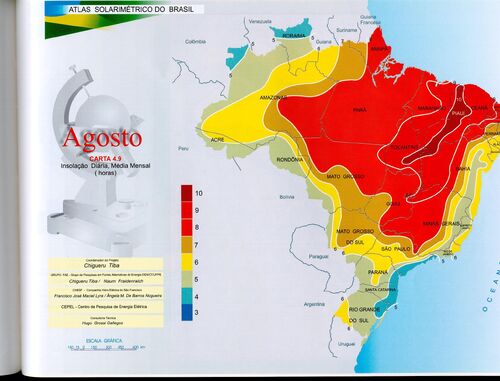
Solar insolation in August
Solar Cookers International has rated Brazil as the #7 country in the world in terms of solar cooking potential (See: The 25 countries with the most solar cooking potential). The estimated number of people in Brazil with fuel scarcity but ample sun in 2020 is 8,400,000.
In Brazil, huge areas are being transformed into deserts, particularly in Rio Grande do Sul and in the Northeast. By percentages, the state most affected by the desertification is Rio Grande do Norte, with 80.5% of its territory virtually transformed into desert, followed by Pernambuco with 75.2%, Paraiba with 70.3%, Ceara with 59.7%, and Sergipe with 31.3%.
Brazil loses about 300 million dollars annually due to the desertification that takes place principally in the states of the Northeast region and in the north of Minas Gerais. The Brazilian Government’s Annual Report, regarding the major flora of the world, shows that the destruction of the Amazon’s flora continues in a constant rhythm with the growth inspection around the risk areas. The Brazilian Amazon lost 16,926 km2 from the forests between 1998 and 1999.
But the actions up until that time put into effect by the Department of the Environment contributed to a strong reduction in the areas of the Amazon forest that were cleared, and already saw a fall of 90% in 2009.
The reduction of these extensive green areas is responsible for the reduction of rainfall levels, for the increased concentration of carbon dioxide in the atmosphere which ultimately causes the greenhouse effect, even turning soil vulnerable to erosion.
The daily demand of firewood per family would be 3.1 kg (6.8 lbs), which is near 1131.5 kg (2489.3 lbs) annually. This reasoning assumes that the mass use of firewood is for food preparation.
According to the UN "one forth part of the Brazilian territory is threatened by the process of accelerated desertification." The introduction and use of solar cookers represents a priceless contribution to reducing desertification, soil erosion, and assuring the survival of the people, animals, and natural resources.
See also:
- The climate of Brazil - Wikipedia
- Brazil Energy Situation - Energypedia
- Solar cooker dissemination and cultural variables
Resources[]
Possible funding[]
Facebook groups[]
- COCINER@S SOLARES SIN FRONTERAS
- Cozimento Solar Brasil
- Sunny Cooking Fogões Solares
- Garota Intelligentsia
- Pleno Sol
- Associação Caatinga
Discussion groups[]
- Fogão Solar Brasil (WhatsApp group)
Blogs[]
Materials[]
Conference presentations[]
- January 2016: Solar Cooking in South Brazil: Dissemination and Barriers - Elmo Dutra
Articles in the media[]
- November 2022: Fogão solar: alternativa para tempos de crise - Sler... (English version)
- June 2014: Gestor ambiental aposta em forno solar como alternativa energética - Glogo.com (English version)
- August 2012: Argentino desenvolve fogão solar e invenções ambientais, no ES - G1 ES
- August 2009: Índios de MS experimentam fogão solar - Povos Indígenas no Brasil
Audio and video[]
- July 2023:
S3A2 Pedro Henrique Campello Santos et al. (Brazil)- Use of a Scheffler-type solar concentrator ...-2
Comparing other commercial production methods of Brazil's produce with solar food processing
- October 2021:
- March 2020: Prof. Elmo Dutra Filho – Teaching Solar Cooking to Poor People in Brazil - SunPod
- September 2015:
USP - Encontro de Cozinha Solar
No dia 21 de setembro 2015, um encontro na Escola Politécnica (Poli) da USP mostrou que é possível cozinhar sem eletricidade, gás ou lenha. Materiais acessíveis como papelão e alumínio são suficientes para construir um forno solar simples capaz de assar bolos e preparar refeições. Além de vantagens sociais e ambientais, a cozinha solar ainda proporciona uma comida saborosa e nutritiva. See: Celestino Ruivo
- May 2012:
- January 2011: A small village in Paraiba coverts to parabolic solar cookers
- December 2010: Forno Solar
- June 2010: Fogão Solar on TV news
- December 2008: Forno solar para zona rural
- July 2008: Forno solar
- June 2008: Brazilian TV covers "A Solar Cooker Made at Home".
- Feb. 2008: Aprenda A Fazer Um Fogão Solar Por R$ 30
Web pages[]
Contacts[]
The entities listed below are either based in Brazil, or have established solar cooking projects there:
SCI Associates[]
- Main article: Solar Cookers International Association
NGOs[]
Manufacturers and vendors[]
Individuals[]
Government agencies[]
Educational institutions[]
See also[]
- Category:Acre
- Category:Alagoas
- Category:Amapá
- Category:Amazonas
- Category:Bahia
- Brazil news archive
- Category:Ceará
- Category:Distrito Federal
- Category:Espírito Santo
- Forno Solar P.S. Multiuso 2012
- Category:Goiás
- Category:Maranhão
- Category:Mato Grosso
- Category:Mato Grosso do Sul
- Category:Minas Gerais
- Category:Paraná
- Category:Paraíba
- Category:Pará
- Category:Pernambuco
- Category:Piauí
- Category:Rio Grande do Norte
- Category:Rio Grande do Sul
- Category:Rio de Janeiro
- Category:Rondônia
- Category:Roraima
- Category:Santa Catarina
- Category:Sergipe
- States of Brazil
- Category:São Paulo
- Category:Tocantins

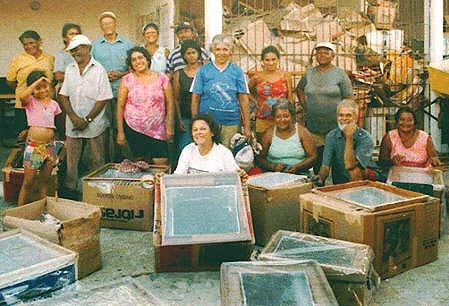

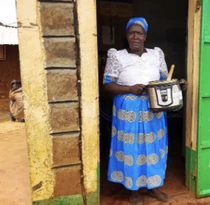
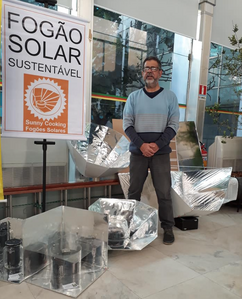
![Fogao Solar display -2 at Porto Alegre, Brazil, 8-8-19.png (669 KB) Fogão Solar solar cooking display at Porto Alegre]](https://static.wikia.nocookie.net/solarcooking/images/5/5b/Fogao_Solar_display_-2_at_Porto_Alegre%2C_Brazil%2C_8-8-19.png/revision/latest/scale-to-width-down/300?cb=20190808163426)

